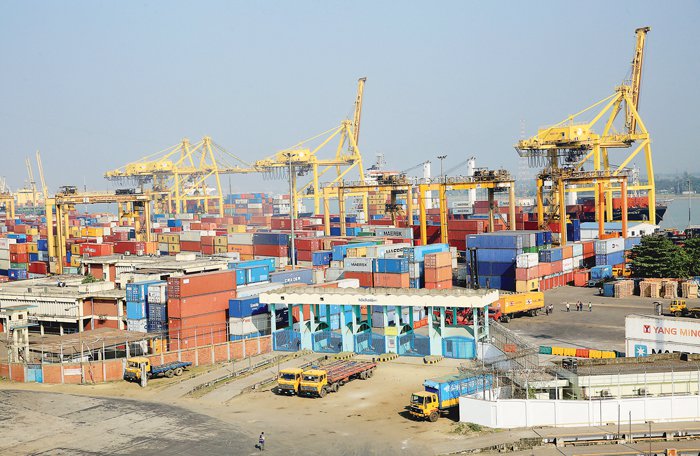
Bangladesh Bank governor Fazle Kabir, deputy governors SK Sur Chowdhury and Abu Hena Mohd Razee Hassan, and Association of Bankers, Bangladesh president Anis A Khan are present, among others, at the unveiling ceremony of the BB Financial Stability Report 2015 at the BB headquarters in Dhaka on Monday.
Bangladesh Bank on Monday said that a large volume of rescheduled and restructured loans created concern for credit risk management of the country’s banking industry in 2015.
In the absence of an orderly recovery of rescheduled and restructured loans, the banks will suffer from non-earning assets, lower profitability and deteriorating equity base, according to the BB Financial Stability Report 2015.
BB governor Fazle Kabir unveiled the report at the central bank headquarters in the capital while managing directors and chief executive officers of all banks and non-bank financial institutions were present.
The large volume of rescheduled and restructured loans will increase the cost of capital, widen the mismatch between interest-earning assets and interest-bearing liabilities and Economic Value Additions (EVA) by banks, the BB report said. EVA is equal to the net operating profit minus cost of capital.
The rescheduled loans constituted a significant portion of the banks’ total loan portfolio in 2015.
The rescheduled loans were 4.5 per cent of bank’s total outstanding loans of Tk 5,84,615.49 crore and 5 per cent of total unclassified loans of Tk 5,33,244.27 crore in 2015.
Under the large loan restructuring policy, the BB restructured Tk 16,410 crore the last year.
The restructured loans constituted 2.8 per cent of total loans outstanding, 3.1 per cent of total unclassified loans and 17.4 per cent of total stressed advances.
The stressed advances included the classified loans, rescheduled and restructured loans.
The BB report said that the stressed advances ratio rose to 16.1 per cent in 2015 from 13.1 per cent in 2014.
Though the gross non-performing loan ratio in 2015 was 90 basis points lower than that of previous year, higher percentages of rescheduled and restructured loans led to the rise of stressed advances ratio over the previous year, it said.
The classified loan stood at Tk 51,371 crore, or 8.79 per cent of total outstanding loan amounting to Tk 5,84,615 crore in 2015. The NPL was Tk 50,155 crore, or 9.69 per cent of total outstanding loans of Tk 5,17,837 crore in 2014.
BB joint director Mohammad Shahriar Siddiqui presented the summary of the Financial Stability Report for 2015.
He said that the central bank had recently introduced the Central Database for Large Credit (CDLC) to monitor accurately the large loans.
The BB included the funded and non-funded loans with the database which crossed Tk 50 crore in favor of a corporate group or a single person, he said.
The central bank will form joint lenders’ forum (JLF) if any loan faced crisis which is attached with the CDLC, he said.
The JLF will be formed attaching the banks and NBFIs, which give the loans to the corporate group or single person, to tackle the crisis.
Fazle Kabir said that despite the prevalence of various challenges, major macroeconomic indicators
demonstrated improvement due to judicious policy taken by the government as well as BB.
‘Though, like 2014, banks continued to take cautious approach in loan disbursement while investing a large amount in safer liquid instruments, credit growth was promising as it maintained the increasing trend’, he said.
Association of Bankers, Bangladesh president Anis A Khan said that the banking industry should take initiative to reduce the higher classified loans as the NPL usually
put an adverse impact on the financial health of the banks.
Bangladesh Leasing and Finance Companies Association chairman Mafizuddin Sarker said that the country’s financial sector had faced an image crisis as some financial institutions entered into the problematic zone.
The financial stability report will help to tackle the problems, he said.
Source: New Age









